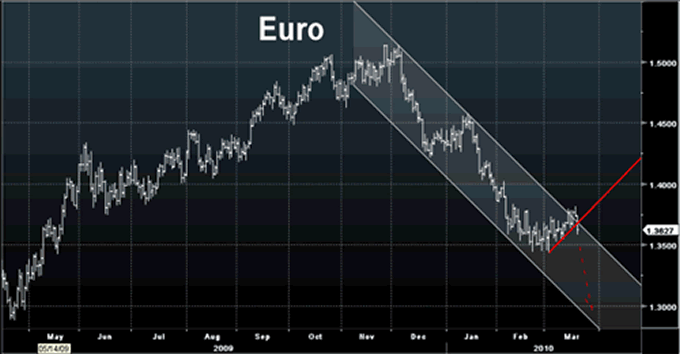Next Down Leg for the Euro
Currencies / Euro Mar 20, 2010 - 03:10 PM GMTBy: Bryan_Rich
 There are two major issues facing global currencies in the months ahead. And both have escalated in the past week.
There are two major issues facing global currencies in the months ahead. And both have escalated in the past week.
Issue #1: The Greek Drama
Act I: Sovereign debt fears
In the first act of the euro-zone sovereign debt shock, shaky Greek government finances exposed the structural flaws of the euro. And as the lens of scrutiny widened, the potential domino effect of weak euro-zone countries combined to represent a viable threat to the future existence of the euro.
I called attention to this vulnerability back in early January in my piece, Will the Euro Become the Most Hated Currency for 2010? Since then, the euro plunged another 6 percent against the dollar and the outlook has grown increasingly tenuous.
Intermission:
Bail out?
But in came talks of a bail out. And that marked a timeout for the massive speculative selling pressure against the euro. Euro-zone leaders gathered and emerged with a promise of support for its flagging member country, Greece. But the implications of such a decision would bring with it an irreparable moral hazard. If Greece could be bailed out, that opens the floodgates for the other weak countries in the euro zone to come looking for support from their more fiscally responsible neighbors.
Now, with increasing signs that no concrete form of financial aid will be offered to Greece, the sovereign debt problems weighing on the euro currency are approaching Act II.
Act II: The realization of a no-win situation for the euro …
A bail out of a fellow Economic and Monetary Union (EMU) member country is a direct violation of rules set forth in the Stability and Growth Pact, the principles upon which the euro was built. And that’s why euro-zone leadership has been slow to provide details of their proposed support.
But this past week, Greek Prime Minister Papandreou turned up the heat. He asked for a definitive decision on aid from Europe to come by next week. His bargaining chip: IFM aid. If the euro zone is not prepared to step in with financial aid, he’ll turn to the IMF. And a turn to the IMF represents a further credibility hit for the European monetary union … i.e. the structure of the euro is flawed, its rules are unenforceable and solidarity isn’t possible.
And with an official deadline for speculators to lean on, this coming week could bring with it the catalyst for the next big leg down in the euro.
Take a look at this chart …

Source: Bloomberg
The euro had a false break from the four-month bear channel, but now is on track to test the lower line of this channel, which projects a test of the 2009 lows of 1.2457 by the end of April. Coincidentally, Greece will have to come up with 14 billion dollars in fresh capital to refinance maturing government debt by that time.
And as I laid out in my February 20th Money and Markets column, The Future of the Euro in Question, expect the intense scrutiny surrounding the lifespan of the euro to continue.
The EMU countries with damaged balance sheets and a bleak outlook for growth are stuck. With a one-size fits all monetary policy and currency, they lack critical tools to work their way out.
Issue #2: China’s Currency
While a sovereign debt crisis will likely be potent enough to knock global recovery off track, the most severe threat to the global economy remains China’s currency, as I discussed in my February 27th column, Why You Should Be Worried About China.
And the issue with China’s currency heated up this week.
With the healthcare debacle in Washington death-spiraling favorability polls, it became time to pull out the China card again.
 |
| Senators Schumer and Graham are spearheading efforts to force China to revalue its currency. |
Last week Congress resurrected threats against China’s currency policy. In 2005, Senators Graham and Schumer, lobbied a bill which threatened a 27.5 percent tariff on Chinese imports, unless China revalued its currency. Now the two Senators are spearheading new rules for the way the U.S. Treasury manages currency manipulators and proposes tougher consequences.
Tougher Talk … More Resistance
In 2005, the global economy was humming along, and China had a lot to lose by not showing some concession. Today, times are different. Global demand is weak and China’s major trading partners are dealing with sluggish growth. And despite the assertions of China’s emerging domestic demand, China has built its economic model on exports. So, in tough times, disabling their trade advantage through a currency revaluation is not likely.
That’s why I’ve been expecting China’s currency policy to be the biggest threat to global economy recovery — fueling protectionism and damaging the global economy (see my September piece Protectionism: Enemy of Recovery for more details).
Overall, the issues with sovereign debt and global imbalances, fueled by China’s weak currency, present a big challenge for the global economy. That’s why I expect a sustained risk aversion to be the dominant theme of 2010.
Regards,
Bryan
Weiss and Weiss Research analysts offering the latest investing news and financial insights for the stock market, including tips and advice on investing in gold, energy and oil. Dr. Weiss is a leader in the fields of investing, interest rates, financial safety and economic forecasting. To view archives or subscribe, visit http://www.moneyandmarkets.com.
© 2005-2022 http://www.MarketOracle.co.uk - The Market Oracle is a FREE Daily Financial Markets Analysis & Forecasting online publication.



